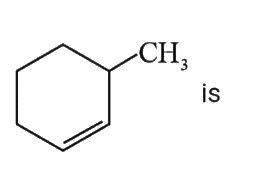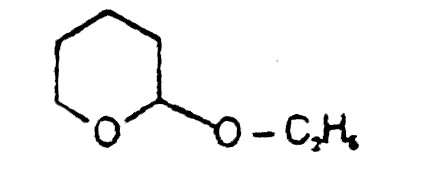The product of acid catalyzed hydration of 2−pheny1propene is
3-phenyl-2-propanol
1-phenyl-2-propanol
2-phenyl-2-propanol
2-phenyl-1-propanol
The correct Answer is:C
To solve the question about the product of acid-catalyzed hydration of 2-phenyl-1-propene, we can follow these steps:
Step 1: Identify the structure of 2-phenyl-1-propene
2-phenyl-1-propene is an alkene with a phenyl group attached to the second carbon of the propene chain. Its structure can be represented as follows:
C6H5∣H2C=C−CH3
Step 2: Understand acid-catalyzed hydration
Acid-catalyzed hydration involves the addition of water (H2O) to an alkene in the presence of an acid (like H2SO4). The acid donates a proton (H+) to the alkene, leading to the formation of a carbocation.
Step 3: Protonation of the alkene
In the presence of an acid, the double bond in 2-phenyl-1-propene will be protonated. The more stable carbocation will form. Since 2-phenyl-1-propene can form a tertiary carbocation, the protonation occurs at the terminal carbon (the one with the methyl group), leading to the following carbocation:
C6H5∣C+−CH3
Step 4: Nucleophilic attack by water
Water (acting as a nucleophile) will attack the positively charged carbon (the carbocation) to form an alcohol. The water molecule adds to the carbocation, resulting in the formation of a protonated alcohol.
Step 5: Deprotonation
The protonated alcohol will lose a proton (H+) to yield the final product. The final product of this reaction is 2-phenyl-2-propanol:
C6H5∣C(OH)−CH3
Conclusion
The product of the acid-catalyzed hydration of 2-phenyl-1-propene is 2-phenyl-2-propanol.
Answer
The correct answer is option 3: 2-phenyl-2-propanol.
---
2-phenyl-1-propene is an alkene with a phenyl group attached to the second carbon of the propene chain. Its structure can be represented as follows:
Acid-catalyzed hydration involves the addition of water (H2O) to an alkene in the presence of an acid (like H2SO4). The acid donates a proton (H+) to the alkene, leading to the formation of a carbocation.
In the presence of an acid, the double bond in 2-phenyl-1-propene will be protonated. The more stable carbocation will form. Since 2-phenyl-1-propene can form a tertiary carbocation, the protonation occurs at the terminal carbon (the one with the methyl group), leading to the following carbocation:
Water (acting as a nucleophile) will attack the positively charged carbon (the carbocation) to form an alcohol. The water molecule adds to the carbocation, resulting in the formation of a protonated alcohol.
The protonated alcohol will lose a proton (H+) to yield the final product. The final product of this reaction is 2-phenyl-2-propanol:
The product of the acid-catalyzed hydration of 2-phenyl-1-propene is 2-phenyl-2-propanol.
The correct answer is option 3: 2-phenyl-2-propanol.
Topper's Solved these Questions
- ALCOHOLS, PHENOLS & ETHERS BOOK - VMC MODULES ENGLISHCHAPTER - ALCOHOLS, PHENOLS & ETHERS EXERCISE - PRACTICE EXERCISE:2
12 Videos
- ALCOHOLS, PHENOLS & ETHERS BOOK - VMC MODULES ENGLISHCHAPTER - ALCOHOLS, PHENOLS & ETHERS EXERCISE - PRACTICE EXERCISE:3
8 Videos
- ALCOHOLS, PHENOLS & ETHERS BOOK - VMC MODULES ENGLISHCHAPTER - ALCOHOLS, PHENOLS & ETHERS EXERCISE - Example
20 Videos
- 13-14 HYDROGEN & S-BLOCK ELEMENTBOOK - VMC MODULES ENGLISHCHAPTER - 13-14 HYDROGEN & S-BLOCK ELEMENTEXERCISE - JEE Advanced Archive
48 Videos
- ALCOHOLS, PHENOLS & ETHERSBOOK - VMC MODULES ENGLISHCHAPTER - ALCOHOLS, PHENOLS & ETHERSEXERCISE - Impeccable
100 Videos
Similar Questions
Knowledge Check
The major product of acid catalysed dehydration of 2-methylcyclohexanol and butan-1-ol are respectively
A1-methylcyclohexene and but-1-eneB2-methylcyclohexene and but-2-eneC2-methylcyclohexene and butaneD1-methylcyclohexene and but-2-ene.2-Phenylpropene on acidic hydration gives :
A2-Phenyl-2-propanolB2-Phenyl-1-propanolC3-Phenyl-1-propanolD1-Phenyl-2-propanol
The product(s) of reaction catalyzed by nitrogenase in root nodules of leguminous plants is/are:
View SolutionWhich of the following alkene in acid catalysed hydration form 2−methyl propan −2−ol ?
View SolutionThe major product obtained in the photo catalyzed bromination of 2-methylbutane is :
View SolutionIn the acid catalyzed dehydration of alcohols to alkenes, the intermediate species formed is
View SolutionName the product obtained on addition of a water molecule of propene in the presence of dil. H2SO4
View Solution2-Phenylpropene on acidic hydration gives:
View Solution


